Positive Masculinity in Kingdom of Heaven
Kingdom of Heaven is Ridley Scott’s 2005 Crusades epic. It depicts a period of history when an egomaniac, rallying radicalised jingoists, takes over from a cool-headed man of peace. So a re-watch of its Director’s Cut and some spoiler-filled analysis felt timely.
The film follows Balian (Orlando Bloom), a heavily-fictionalised portrayal of the knight who defended Jerusalem during Saladin’s 1187 siege. Much has been analysed about the film’s depiction of conflict between “Islam” and “the West”. Much has been written about how superior the Director’s Cut is to the theatrical release. The broadened scope for the story revealed a sprawling epic with multiple characters dying throughout as they navigate murky political situations. You know? Like the HBO shows everyone loves now? It also gives more impact to Balian’s central character arc, even though the theatrical cut was shorter to focus more narrowly on it. That IS an example of irony because what they tried doing had the opposite effect of what they wanted.
The modern relevance that struck me on this viewing was its depiction of conflict between different forms of masculinity. Balian struggles to navigate doing the right thing in a tumultuous world. The film explores moral responsibility in individuals and the collective, for the religious and the secular. Yes, it gets preachy. Calling it Kingdom of Heaven was a red flag. And yes, imbuing historical characters with modern values is anachronistic and heavy-handed. But this film is underrated for many reasons, particularly for its exploration of toxic masculinity, and the implied concept of positive masculinity.
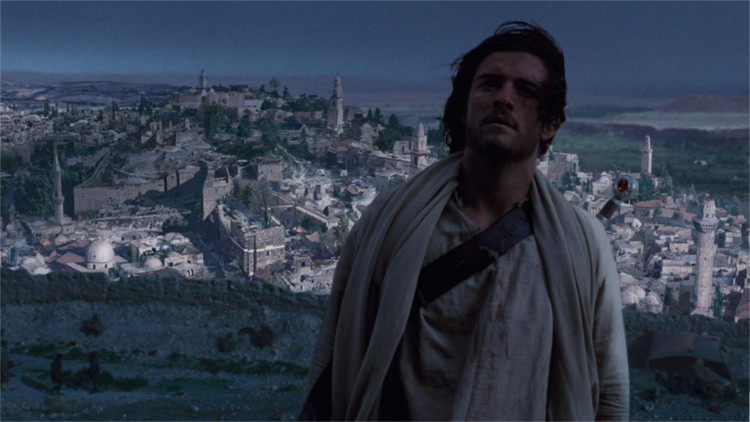
2000’s Gladiator is Ridley Scott’s other sword-and-sandals blockbuster about a brooding sword-fighter grieving for his wife and child. Maximus tends to be better remembered as a role model of positive masculinity. This seems to stem more from Russell Crowe’s macho aura than any particular depth to his character beyond revenge and “strength and honour”. Balian is the other way around in that he is a leader with internal struggles but he is not stereotypically “alpha-male”. Yet Orlando Bloom is better-cast in this than people give him credit for.
Balian is awkward in many scenes because he is meant to be a fish-out-of-water, an introvert in an exotic locale full of over-the-top political agitators. He feels out of place, speaks very curtly and avoids eye contact. One could infer that Balian is meant to have undiagnosed Asperger’s Syndrome but I already went down that road with Anne Frank, so I better not make a habit of doing this. Either way, there are only two kinds of characters Balian has fluid conversation with; strong men and strong women.
The film begins with Balian, a blacksmith in medieval France, gripped by depression which Bloom portrays very well. He grieves for a stillborn child and a wife who then took her own life. He is a man adrift with nothing left to live for. Knights from the Christian-established Kingdom of Jerusalem arrive in Balian’s village and hire him to make horseshoes. Balian does not speak much until a German soldier in their entourage asks Balian if he had been at war. There is a moment of recognition between the men, that they are both veterans, and Balian explains he was an engineer in a minor feudal war. I won’t point out every improvement the Director’s Cut makes, but knowing this background makes everything Balian does more plausible. As a skilled warrior and scientist, he would be a valuable part of their Crusade.
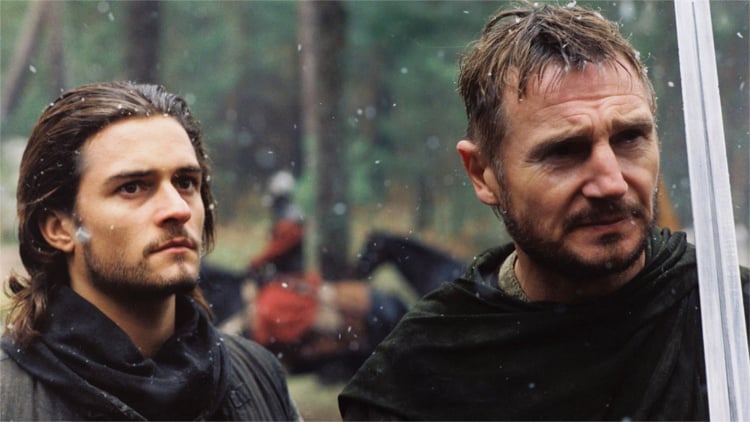
It is revealed that these Crusaders are led by the knight Godfrey, baron of Ibelin (Liam Neeson) who is in fact Balian’s estranged father. Balian travels to the Middle-East with them but since Godfrey dies on the journey, Balian is knighted and inherits his land in Ibelin. Balian is first brought to Godfrey’s lavish city villa in Jerusalem. When the King’s sister Sibylla (Eva Green) bursts in on horseback with her entourage, she is seeking the son of her friend Godfrey and asks Balian, “Where’s your master?” Balian simply replies, “I have none.”
Balian’s calm reply is striking not only for his refusal to put her on a pedestal but for not feeling the need to clarify “I’m the new baron” or whatever. Balian is out-of-his-depth in this world of noblemen and princesses yet they perceive him as having a strong-silent type, detached attitude. Sibylla demands a drink of water. With neither self-importance nor timidity, he quietly gets her a drink. She thanks him and tells him, “If you see Balian, the son of Godfrey, tell him Sibylla called”.
Balian doesn’t jump in to correct her, he just watches her leave. She later reveals she’d figured out who he was at that point. She has lived her life surrounded by older men and conniving politicians; here comes this new guy, roughly her age, who has no pretensions about him. He doesn’t become arrogant because he’s inherited land. He doesn’t flirt with her just because she’s attractive. He doesn’t even say anything beyond what needs to be said. He is an oasis of calm in a threatening world. And I suppose looking like Orlando Bloom helps.
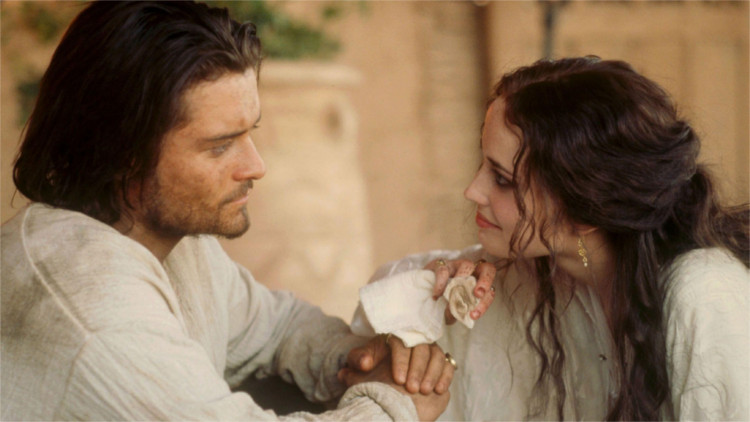
This heterosexual Hollywood romance sees the woman being the sexually-aggressive one. She starts pursuing him flirtatiously and he opens up to her as their affair intensifies. She is married to the power-hungry fundamentalist Guy de Lusignan (Marton Csokas). His alpha-male posturing and conniving villainy are in conflict with Balian’s form of masculinity. Balian prays all night at the site of the crucifixion, loses his faith but continues striving to be ethical. Guy is the Dunning-Kruger effect incarnate; he’s not going to take time to doubt himself.
The contrast is made clearer by the kind of men with whom Balian forms friendships. David Thewlis’ Hospitaller Knight is an awesome performance, which screenwriter William Monahan confirmed was based on God. Balian’s Muslim counterpart Imad ad-Din (Alexander Siddig) notes Balian’s decency with one of the coolest lines in the movie; “Your quality will be known among your enemies, before ever you meet them my friend”.
He even befriends King Baldwin IV, which is a great overlooked performance from Edward Norton. The King wears a silver mask to hide the impact of his leprosy but continues to govern Jerusalem as an open place of worship for all faiths. Speaking wisdom in a soft voice, he is depicted as a compassionate man of great courage, the kind Balian could admire. The cinema version shows them playing chess briefly but the Director’s Cut shows them spending hours together discussing the city’s defences and bonding over conversation.
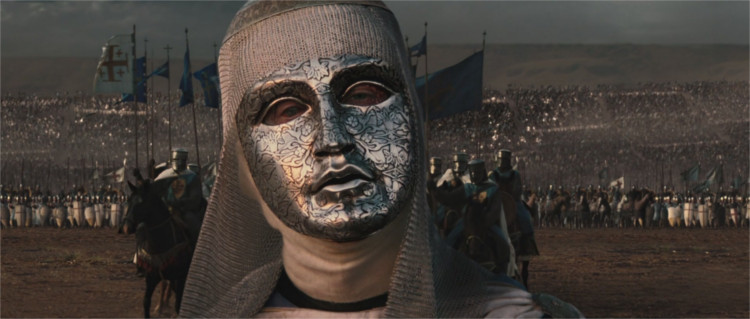
Before Balian travels to his inherited land in Ibelin, he meets the more cynical Tiberias, the Marshall of Jerusalem (Jeremy Irons). He welcomes his dead friend Godfrey’s son with open arms. Godfrey’s name is so respected that all sorts of doors, including the King’s, are open to Balian. This only makes him feel more awkward for having not earned this respect for himself.
When Tiberias asks Balian what his father expected of him, Balian says, “That I was to be a good knight.” Tiberias drily responds, “I pray Jerusalem and the world can accommodate such a rarity as a perfect knight”.
This dismissal of Balian’s idealism is reminiscent of “white knight”, a term used disparagingly against men who promote social justice. Balian is literally a knight so with 2010s hindsight, it adds another undertone of man-on-man resentment when towards the end of the film, Guy taunts Balian saying, “A perfect knight? Is that what you think you are?” Any time I see that scene I keep expecting him to add, “You cuck, You SJW” and so on. When it comes to depicting toxic masculinity, the film is less subtle and any scenes with Guy de Lusignan or Brendan Gleeson’s Reynald de Chatillon are pretty self-explanatory, if delightfully over-the-top.
If Guy takes the throne through his marriage to Sibylla, he will lead his religious fanatics to war against the Islamic power in the region led by Saladin, or salah-haddin as this film makes an effort to pronounce. The King wants Balian to take over the army of Jerusalem so that it is out of the hands of Guy. He also wants Balian to marry Sibylla so that he will assume the role of King instead of Guy de Lusignan. Balian asks what would happen to Guy and Tiberias tells him “He will be executed, along with all his knights who do not follow your command.”
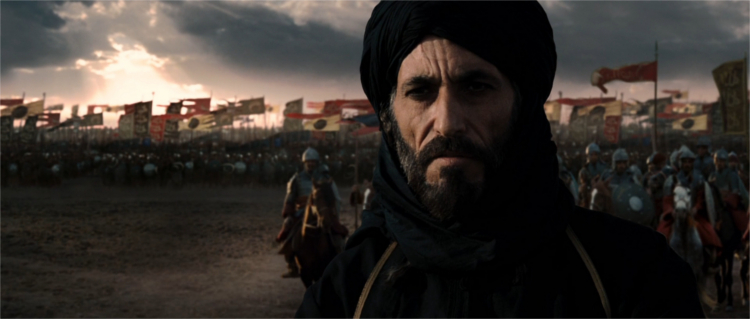
Amazingly, the small moment of Balian’s reaction shot to this news is notably more impactful in the Director’s Cut because of a change in music. Harry Gregson-Williams’ soundtrack is really phenomenal yet a better choice of music here somehow makes it clearer what Balian has processed. He may get the woman of his dreams and the ultimate promotion but it would lead to thousands of people dying. Nasty, dangerous, blood-thirsty bigots, but human lives nonetheless. Balian cannot accept that scale of murder for his self-interest, however much Tiberias frames it as the national interest. Balian recalls his earlier conversation with The King in which he told Balian:
“A King may move a man, a father may claim a son, but always remember that your soul is in your keeping alone. When you stand before God and his judgement you cannot say, ‘But I was told by others to do thus’ or that ‘Virtue was not convenient at the time’. This will not suffice. Remember that.”
Balian tells the King that “the soul belongs to the man” so he cannot go along with this. The King disappointedly accepts his decision. Tiberias is having none of it and only sees Balian as a self-important git who’s screwed up his plan for an objectively more stable, compassionate government. They’d even sweetened the deal by giving Balian everything. His appeal to realpolitik is rejected by Balian who says, “No. It is a kingdom of conscience. Or nothing.” This is quickly followed by a scene of Sibylla admonishing him for turning down marriage with her. Balian turns away from her kiss and says, “Do you think I’m like Guy? That I would sell my soul?”
Guy de Lusignan ascends to the throne and as everyone expected he marches to war with Saladin. He announces this after killing an emissary and muttering, “I am Jerusalem”. This is, again, a pretty blunt illustration of toxic masculinity; a fixation on his ego more than any professed values. Balian fights off assassins sent by Guy and walks in on his military council. But he is not motivated to take revenge on Guy; his priority is to warn them against taking the army away from Jerusalem. “Salah-haddin wants you to come out,” he tells them, “He is waiting for you to make that mistake”. This is ignored, the clamour for war being too passionate, so Balian and Tiberias opt out of sending their troops with Guy. Many soldiers are marched into the desert. Dehydrated and exhausted, they get easily slaughtered by Saladin’s men at the Battle of Hattin.
Balian only has a small number of soldiers and knights to command when he assumes the role of defending Jerusalem now that King Guy is being held hostage. His plans for the ballistic neutralising of siege equipment are informed by his engineering brilliance in the Director’s Cut, or skills randomly acquired out of nowhere in the cinema cut. Balian knights every able-bodied man and rallies them to fight back the siege across several impeccably-staged action scenes.

The resulting stalemate forces Saladin to negotiate terms with Balian. Balian, in what seems to be the only overlap with the historical Balian of Ibelin, surrenders Jerusalem to Muslim control in exchange for safe passage of Christians to Europe. Balian has managed to save thousands of lives and is greeted as a hero. Amidst the turmoil of brutal religious conflict, he stood by a rational policy of harm reduction and it paid off. But as he prepares to leave the city, in the Director’s Cut, Guy is released from captivity and seeks out Balian to taunt him into a swordfight. Balian beats him to his knees and in one sword-stroke he could kill the man who caused so much hardship and had tried to kill him. Guy sees the rage in Balian’s face and dejectedly says, “Do it”. Balian resists his urges and says, “When you rise again, if you do rise… Rise a Knight”. Balian walks away, leaving Guy to wallow in humiliation and probably grumble something about “snowflakes”.
Riding past the line of Christian refugees, beginning their long march to the coast, Balian notices Sibylla, having shorn her hair and abdicated her role as Queen. He dismounts his horse and says, “A Queen never walks. And yet you’re walking.” He then walks alongside her without pursuing her further. Strong and silent wins the race as she clutches onto his hand and smiles.
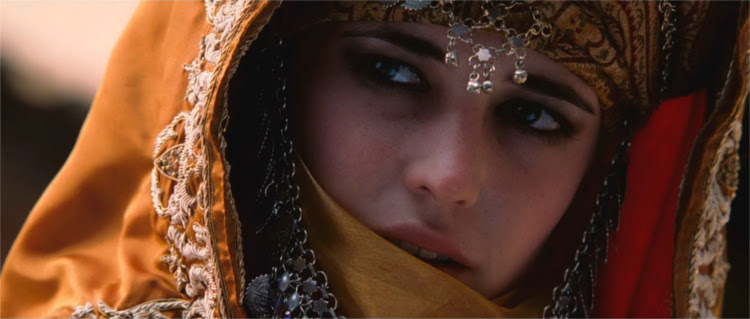
When he is back home in France, he looks around his old home and touchingly reflects on his journey. He reads the wood-carving over his old workplace; “What man is a man who does not make the world better”. His contemplations are interrupted by English knights passing through his village seeking “to recover the Kingdom of Jerusalem”. Balian has no interest in joining them, even when Richard the Lionheart (Iain Glen) tells him, “We have come by this road to find Balian, who was defender of Jerusalem.” Balian replies, “I am the blacksmith,” and watches them head on to the Third Crusade.
Balian then tends to his garden, where there had been a flashback to his smiling wife early in the Director’s Cut. There’s now a moment of symmetry where Balian stands where his wife stood and Sibylla stands smiling lovingly at him from where he had previously stood. This visual callback inverts the male gaze of the earlier scene, with Sibylla revelling in the joy of uniting with such a good man. He found this new love without pursuing her possessively; he was even willing to lose her to do the right thing. Balian stands out among Hollywood protagonists.
Balian conducts himself compassionately and unselfishly in a highly aggressive world. He doesn’t pursue women until they have pursued him. He lets the Muslims win in a Hollywood movie. He cared far more about human casualties than his own ego and was therefore prepared to “lose” an unwinnable battle. This is a nurturing, humanitarian form of masculinity focused on the greater good.
It’s most certainly a projection of modern humanist values onto an historical person nothing like the character depicted here. But as a piece of popular culture, telling a story about how a man should live, it is a different kind of representation than typical gung-ho macho fare. Balian wants a simple life of harmony, not glory or power. Is he not the kind of male role model we should see more of in Hollywood?

